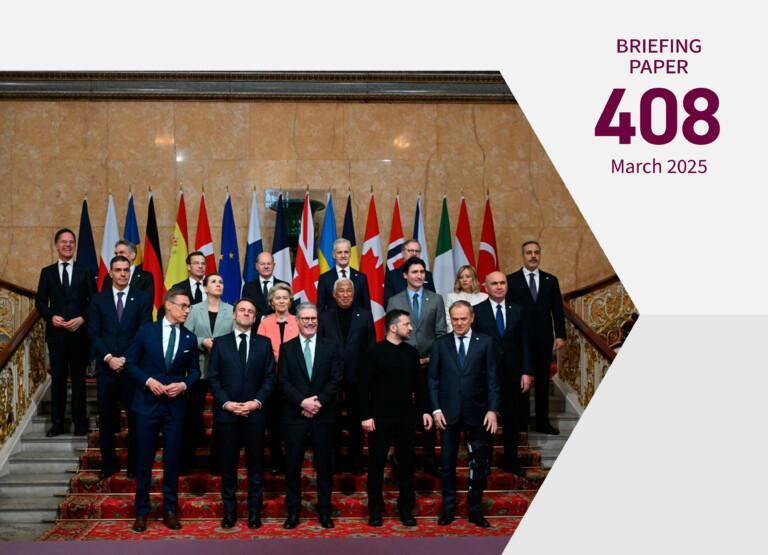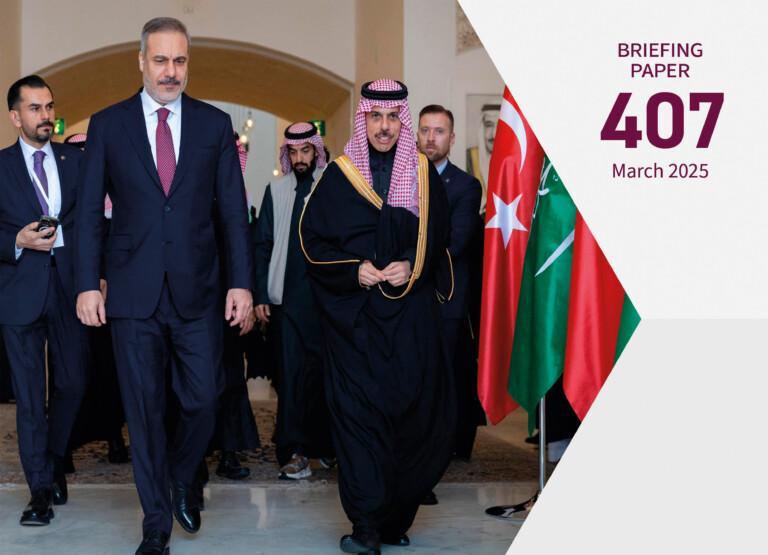
Många inhemska och EU-relaterade utmaningar står i vägen för en fransk-tysk reformagenda för Europeiska unionen. Partnerskapet mellan Paris och Berlin är emellertid stabilt och kan så småningom leda till konkreta resultat.
The European Union is currently dealing with a strenuous Brexit process, an unpredictable transatlantic partnership, democratic backsliding in Hungary and Poland, as well as the erosion of intra-EU solidarity on issues such as the economy and migration. In order to respond to these challenges, comprehensive EU reforms have been called for. A political leadership with the ability to implement such wide-ranging reforms is in high demand.
Since the election of Emmanuel Macron as the new President of France, high hopes have been pinned on the ability of France and Germany to provide the EU with the necessary political leadership. Although the lengthy government-formation process in Germany has dampened expectations somewhat, the entry into office of a second consecutive ‘große Koalition’ under Chancellor Angela Merkel bodes well for initiating a Franco-German reform partnership. However, considerable challenges stand in its way, both at the domestic and at the EU level.
The positions of France and Germany diverge on many key areas of EU policy, including monetary policy, fiscal policy, trade, as well as security and defence policy, but this has not stopped them from jointly shaping EU affairs in the past. The prerequisite for Franco-German leadership has been their ability to agree on mutually acceptable compromises. As the rest of the member states have traditionally viewed either the French or the German position as being close to their own, Franco-German compromises have established a solid foundation for EU-wide agreements. However, there are currently several constraining factors.
The first relates to the domestic political context in Germany. Merkel’s fourth government is likely to be weak and quarrelsome. The Social Democratic Party (SPD) enters the coalition internally divided and unsure of its future. Recent surveys show that the party has hit a historic low in its support, and has already been overtaken by the right-wing populist Alternative for Germany (AfD) in one poll. This makes it a potentially difficult coalition partner for Merkel.
While the Christian Democrats (CDU) and the Christian Social Union (CSU) are in a stronger position, Merkel’s own authority within the alliance has eroded considerably. The CDU’s more conservative wing has been unhappy with Merkel for a long time and the concessions made to the SPD in the coalition negotiations have led to further criticism within the party. The factional disputes will only intensify as the search for Merkel’s successor continues.
The German government will thus be formed by parties that are in the process of intense soul-searching. As a result, the potential for intra-government squabbles is high. The situation is not made any easier by the fact that the EU policy section of the German coalition agreement is rather vague on details, reflecting the lack of consensus on central issues such as Eurozone reform.
The government will also face an emboldened opposition, which includes two parties with very critical attitudes towards further fiscal integration in the Eurozone, the AfD and the liberal Free Democratic Party (FDP). All this will significantly reduce Germany’s room for manoeuvre in EU policy.
The domestic constraints in France are different. Macron’s institutional power is substantial. However, his popularity within the electorate has decreased considerably since his election. Macron’s credibility both at home and in other EU capitals, including Berlin, will be crucially determined by whether his domestic policies and reforms improve the economic fortunes of France.
Considerable challenges to Franco-German leadership can also be found at the EU level. While the positions of France and Germany might still adequately reflect the different attitudes within the EU towards fiscal policy, they no longer do so in many other policy areas, such as migration policy and the rule of law. Here, a deepening divide between the western and a group of eastern member states is emerging. Hence, the idea of differentiated integration is already high on the EU agenda. The coalition agreement shows that Germany is ready to move forward in smaller groups if progress is not possible otherwise. Macron articulated a similar position earlier.
Moreover, the institutional cycle of the EU is nearing its end. The window for presenting new legislation is already closing and will reopen only after the European Parliament elections of spring 2019 and the selection of the next European Commission. Until then, France and Germany would need to focus on circulating ideas and build on existing legislation.
Despite the challenges, Berlin and Paris are genuinely committed to working together. The importance of the bilateral partnership is deeply ingrained in the political culture of both countries and, under the present conditions, both see close cooperation as the only way forward. If France and Germany manage to formulate common positions, they may be able to push through reforms in key areas. For instance, they could agree on the creation of a small investment budget for the Eurozone to stimulate economic growth. They could also shape the new EU multi-annual financial framework, linking EU funds to the rule of law, and deepen defence policy cooperation.
While it may be difficult for all 27 EU members to endorse a potential Franco-German reform agenda, the Berlin-Paris axis still enjoys considerable prestige and influence in most other European capitals. Given the current, difficult international scenario confronting the EU, a large majority of EU members may feel they have no alternative but to follow Franco-German initiatives.










